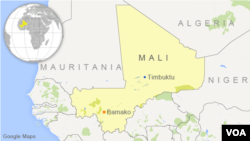The United Nations says it is investigating reports of serious human rights abuses in northern Mali following clashes this week between separatist rebels and pro-government militias.
The U.N. peacekeeping mission in Mali said Friday that a team has been deployed to the northern town of Tin Hama to "establish the facts."
The country's main Tuareg-led rebel alliance, the Coordination of Movements of Azawad (CMA), said the Malian army executed nine civilians in Tin Hama on Thursday. Rebels say one of the victims was a Malian aid worker.
They say the execution took place in the town's market, and say the bodies were left in the public square for many hours.
There has been no independent verification of the report.
The United Nations Office for the Coordination of Humanitarian Affairs reports nearly 30,000 people have fled intensified fighting in northern Mali over the past two weeks. The agency says the displaced are in urgent need of humanitarian assistance.
Sporadic fighting is a way of life in Mali’s turbulent northern region; but, the United Nations is alarmed at the recent increase in violence in small villages surrounding the city of Timbuktu.
A spokesman for the U.N.'s humanitarian office, Jens Laerke, says armed groups and individuals have attacked and displaced thousands of civilians, looted their houses and pillaged their shops and livestock.
“Our partners and local authorities on the ground estimate that over the past two weeks, nearly 27,000 people have fled their homes and villages. In the past week alone, 20,000 people have been uprooted by this violence. The displaced people are currently staying in temporary shelters or with host families in the larger population hubs in the region or on the south bank of the Niger river. They are in urgent need of water, food, non-food items and emergency shelter," said Laerke.
Tuareg separatist rebels have been fighting for an independent state from Mali for decades. The last civil war, which erupted between the rebels and government in January 2012, became particularly vicious and destructive after Islamist groups affiliated with al-Qaida joined the fray.
The legacy of that brutal war lingers on. While 400,000 have returned to the homes they fled in the north, tens of thousands of others remain internally displaced and around 135,000 are still in exile as refugees in neighboring countries. The United Nations has appealed for $377 million to provide humanitarian assistance this year to 1.5 million people.
In mid-May, the government and Tuareg rebels signed a preliminary agreement to end the war. Many people fear this latest flare-up of fighting could doom the fragile peace process.
Laerke tells VOA a mixture of armed individuals, including pro-government militia, Tuareg separatists and criminals out for personal gain are wreaking havoc in the region around Timbuktu.
“It has been simmering a very long time. But, this is clearly a spike, a surge in violence that we have seen in the past couple of weeks…Why this is happening - well, that is a history of, I think 40 or 50 years of Tuareg separatist movement and so on and so forth. It is a very complex pattern of various layers of conflicts there. But, the humanitarian outcome is pretty clear. This is what we are seeing - nearly 30,000 people displaced in a span of just a couple of weeks," he said.
Laerke says humanitarian organizations in the region are pre-positioning relief items and have begun distributing food aid. He says assessment of needs is ongoing, but insecurity is making this difficult. He says the most dangerous area to access is the district of Gourma-Rharous, where more than 15,000 of the displaced are reportedly scattered in different locations.




